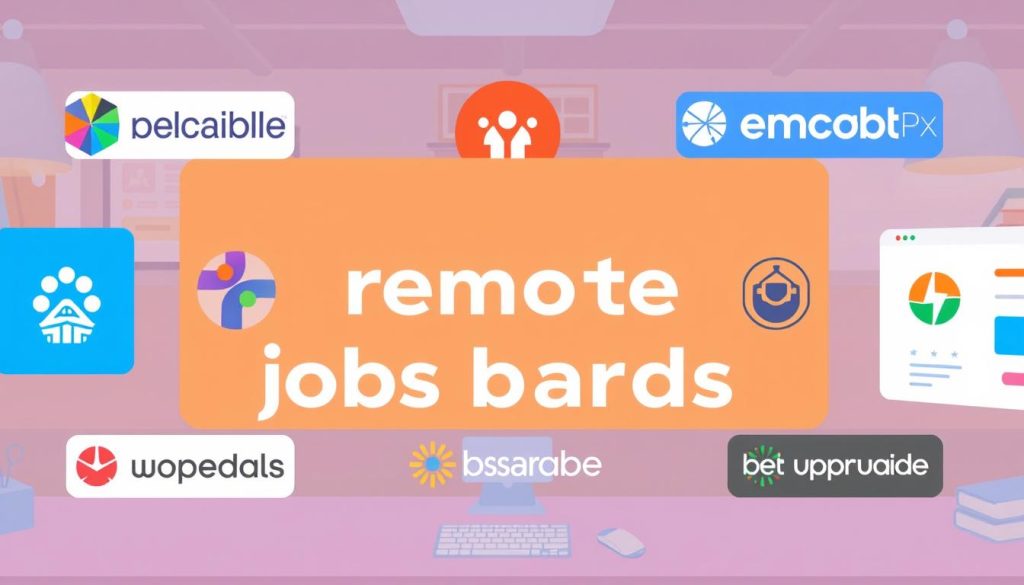The global pandemic has brought about a significant shift in the way we work, with more than half of the American workforce working remotely as of April 2020, according to a survey by freelancing platform Upwork.
This shift has transformed the landscape of professional opportunities, making remote work a sustainable and increasingly mainstream career path.
As a result, professionals can now build secure futures without geographic limitations, enjoying both career stability and personal flexibility.
Table of Contents
Key Takeaways
- Discover how the global shift toward remote work has created stable, long-term career options across multiple industries and skill levels.
- Explore the expanding remote job market and identify roles that offer both immediate opportunities and long-term growth potential.
- Understand how technology, economic shifts, and changing workplace cultures have converged to make remote careers more accessible and sustainable.
- Learn how to navigate the remote work ecosystem to future-proof your career in an increasingly digital economy.
- Gain insights into the benefits of remote work, including career stability and personal flexibility.
The Rise of Remote Work in Today’s Economy
The COVID-19 pandemic has significantly accelerated the adoption of remote work, transforming it into a mainstream phenomenon. As a result, the modern work landscape has undergone a substantial shift.
Accelerating Remote Work Adoption
The pandemic served as a catalyst for remote work adoption, making it a standard operating model for thousands of companies worldwide. According to a survey by Upwork, more than half of the American workforce was working remotely as of April 2020. Before the pandemic, about half of hiring managers hired remote talent; this number has now increased to 94%.
Current Remote Work Statistics
Statistical evidence shows that remote work has become a permanent fixture in the global economy. Remote-first companies experience a 25% lower turnover rate, as employees appreciate the autonomy and freedom that remote jobs provide. The data indicates that remote work is not just a temporary solution but a viable, stable career path.
With 94% of hiring managers now embracing remote talent, it’s clear that remote work has become an integral part of today’s economy, offering numerous jobs and opportunities for growth.
Benefits of Choosing a Remote Career Path

Choosing a remote career path can lead to a more balanced and fulfilling professional life. As the world adapts to remote work, individuals can reap the rewards of a more flexible and autonomous career. This shift has numerous benefits that can enhance both personal and professional well-being.
Improved Work-Life Balance
Working from home often offers a more flexible work schedule, which can help you better manage family responsibilities, hobbies, and other life obligations. With the flexibility to create your own schedule, you can achieve a better work-life balance, leading to increased job satisfaction and overall well-being.
Financial Advantages of Working Remotely
When your home is your office, you can save money on gas, parking, childcare, eating out, and even your work-specific wardrobe. According to various studies, remote workers can enjoy significant financial savings, which can be a substantial advantage.
Location Independence and Flexibility
In the world of remote work, you don’t have to relocate to a new city to get a job. You can live where you want and work for the company you want, no matter where they’re located. This location independence creates unprecedented freedom to design your ideal lifestyle.
Health and Productivity Benefits
Working from home can translate to more time for physical activity, less exposure to illness, the option to create an ergonomic workspace, and more opportunities to eat healthier. As a result, remote workers often experience improved health and productivity. A FlexJobs survey found that more than half of respondents (51 percent) said they’re more productive working from home than they are in the office.
| Benefits | Description | Advantages |
|---|---|---|
| Work-Life Balance | Flexible schedule for personal and professional responsibilities | Increased job satisfaction, overall well-being |
| Financial Savings | Reduced expenses on commuting, wardrobe, and daily meals | Significant financial advantages, improved quality of life |
| Location Independence | Freedom to choose living location regardless of office location | Unprecedented lifestyle design opportunities |
| Health and Productivity | More time for physical activity, healthier eating, and ergonomic workspace | Improved health outcomes, increased productivity |
10 In-Demand Remote Work Options for a Stable Career
The remote job market is booming with numerous career paths offering stability and growth. As we explore these opportunities, it’s essential to understand the various roles that are in demand and how they can contribute to a stable career.
Technology and Software Development Roles
The technology sector continues to be a significant driver of remote job opportunities, with roles that are both lucrative and in high demand.
Software Engineer
Software engineers are crucial in developing and maintaining software applications. With an average salary of $130,160 and a projected growth rate of 25%, this role is both financially rewarding and stable.

Data Scientist
Data scientists play a vital role in analyzing and interpreting complex data. Their average salary is $108,020, with a projected growth rate of 35%, making it a highly sought-after profession.

UX/UI Designer
UX/UI designers focus on creating user-friendly and aesthetically pleasing digital interfaces. With an average salary of $119,584 and a 13% projected growth rate, this role is both creative and in demand.

Customer Support and Service Positions
Customer support roles are essential for companies to maintain high levels of customer satisfaction. These positions can be done remotely and offer a stable career path.
Computer Support Specialist
Computer support specialists assist users with technical issues. They earn an average salary of $60,810, with a 5% projected growth rate, providing a stable career option.

Virtual Assistant
Virtual assistants provide administrative support to businesses and professionals. This role offers flexibility and can be tailored to various industries.

Marketing and Content Creation Opportunities
The marketing sector has seen significant growth in remote job opportunities, particularly in social media management and content creation.
Social Media Manager
Social media managers are responsible for managing a company’s social media presence. They earn an average salary of $56,770, with a 10% projected growth rate.

Content Writer
Content writers create engaging content for various mediums. This role is crucial for businesses looking to establish a strong online presence.

Project Management and Business Operations
Project management roles are critical in ensuring that projects are executed efficiently. These roles are increasingly being done remotely.
Project Manager
Project managers oversee projects from start to finish. They earn an average salary of $98,580, with a significant number of new job opportunities emerging.

Information Security Analyst
Information security analysts are vital in protecting a company’s data from cyber threats. Their average salary is $120,360, with a 32% projected growth rate, highlighting the importance of cybersecurity.

Essential Skills for Remote Work Success
Effective remote work requires a specific skill set that includes communication, time management, and technical proficiency. These skills are vital for remote workers to stay productive and maintain seamless interactions with their teams.
Effective Communication
Effective communication skills are critical in remote environments where face-to-face interaction is limited. Remote workers must master written communication, active listening, and clear articulation of ideas across digital channels. Tools like Slack and Microsoft Teams facilitate asynchronous communication, enabling teams to stay aligned across different time zones.
Self-Discipline and Time Management
Self-discipline and structured routines are foundational to remote work success. Techniques such as time-blocking and the Pomodoro Technique help remote workers maintain productivity. Tools like Trello, Todoist, and Clockify assist in organizing tasks and tracking work patterns, ensuring that professionals can manage their time effectively.
Technical Proficiency
Technical proficiency extends beyond basic computer skills to include troubleshooting, familiarity with collaboration platforms, and digital security practices. Remote workers must be comfortable using cloud storage, collaboration tools, and analytics dashboards. Mastering these tools enables professionals to work efficiently and stay connected with their remote teams.
How to Find and Secure Remote Positions
Remote job searching is an art that involves identifying the right platforms and tailoring your application materials. To start, it’s essential to know where to look for remote jobs and how to effectively utilize job boards.
Top Platforms for Remote Job Searches
To avoid scams, stick to trusted platforms like The SaaS Jobs Board, FlexJobs, Remote.co, and LinkedIn. These sites vet job postings and often provide detailed company reviews. For instance, The SaaS Jobs Board is ideal for those looking for jobs in the SaaS industry.

Building a Remote-Friendly Resume
If you’ve worked remotely before, whether freelancing, contracting, or full-time, make sure to spotlight it in your resume. Detail communication tools, project management methods, and successful campaigns you’ve managed. A dedicated « Skills » section featuring remote-ready abilities can capture recruiters’ attention quickly.
Networking Strategies for Remote Opportunities
Effective networking is crucial for remote job seekers. This includes participating in virtual industry events, joining online communities, and engaging in digital relationship building. By doing so, you can discover opportunities that match your skills and experience level.
Conclusion: Building a Sustainable Remote Career
As we’ve explored the vast landscape of remote work, it’s clear that this isn’t just a temporary shift, but a fundamental change in how careers are built and sustained. By developing key skills such as communication, self-management, and technical proficiency, professionals can create a foundation for long-term success in remote careers.
Remote work offers numerous benefits, including improved work-life balance, financial savings, and location independence. To capitalize on these opportunities, it’s essential to combine strategic job searching on specialized platforms with targeted skill development.
By embracing remote work as a deliberate career choice, professionals can build stable, fulfilling careers that offer both security and flexibility. As the remote work landscape continues to evolve, emerging opportunities in fields like telemedicine and virtual education are expanding the range of stable remote career options.
FAQ
What are the most in-demand skills for remote jobs?
The most sought-after skills for remote work include data science, software development, and digital marketing. Professionals with expertise in these areas can leverage platforms like Coursera to build their skills and stay competitive.
How can I improve my work-life balance while working remotely?
To achieve a better balance, establish a dedicated workspace, set clear boundaries, and prioritize time management. This helps prevent the blurring of lines between work and personal life, ensuring a more sustainable remote career.
What tools are essential for remote team collaboration?
Effective remote teams rely on collaboration tools like Slack, Trello, and Asana to stay organized and communicate efficiently. These platforms facilitate seamless interaction, helping teams stay aligned and productive.
How can I stay productive while working from home?
To maintain productivity, create a structured schedule, minimize distractions, and utilize tools that help you stay focused. SaaS companies often provide resources and tips on maintaining productivity while working remotely.
What are the benefits of being a data scientist in a remote role?
As a data scientist, working remotely offers the flexibility to analyze and interpret complex data from anywhere. This role is particularly well-suited for remote work, allowing professionals to contribute to projects without being tied to a specific location.
How do I apply for remote jobs effectively?
When applying for remote positions, tailor your resume and cover letter to highlight your relevant skills and experience. Utilize job boards and professional networks to find opportunities and stay up-to-date on the latest remote job listings.
What are the key elements of a successful remote career?
A successful remote career is built on self-discipline, technical proficiency, and the ability to communicate effectively. By focusing on these areas, professionals can ensure a stable and fulfilling remote career.





